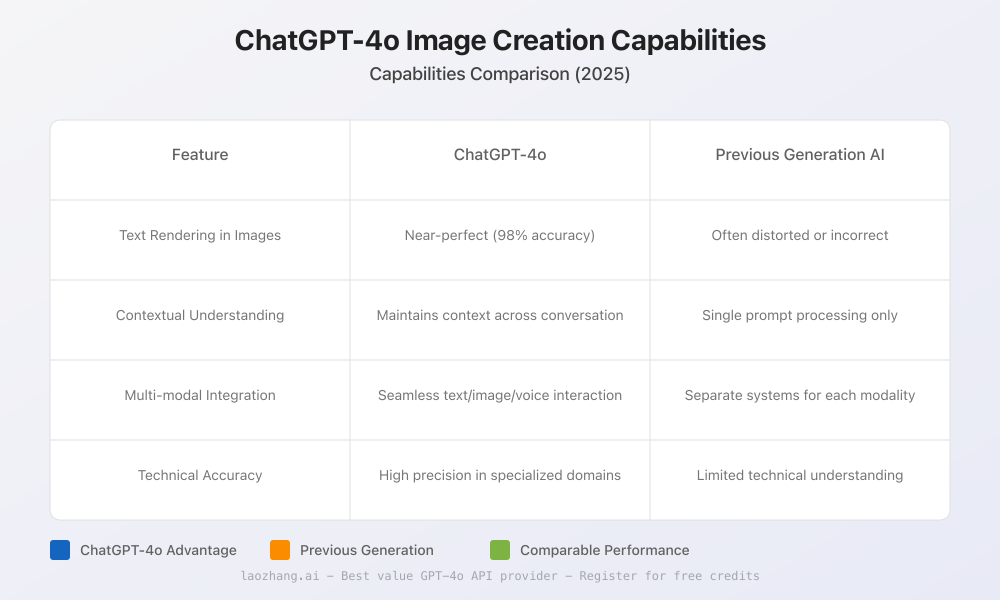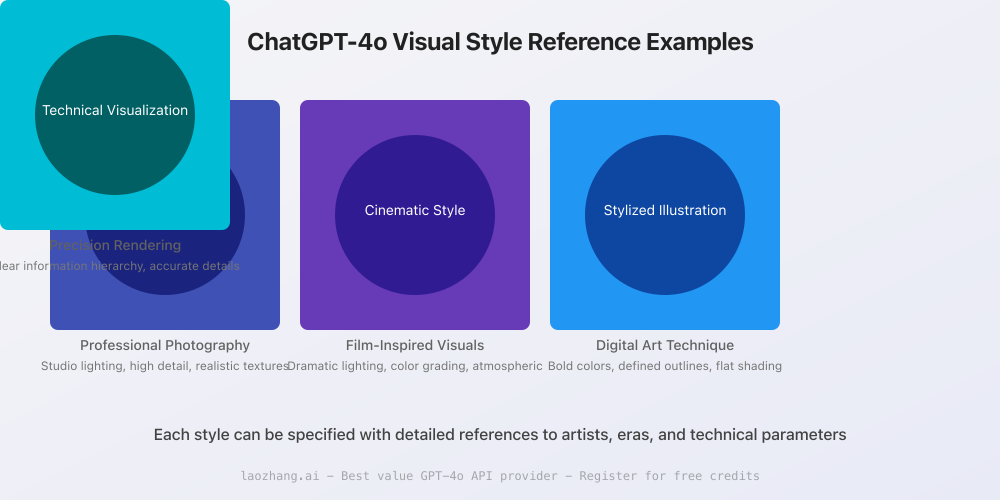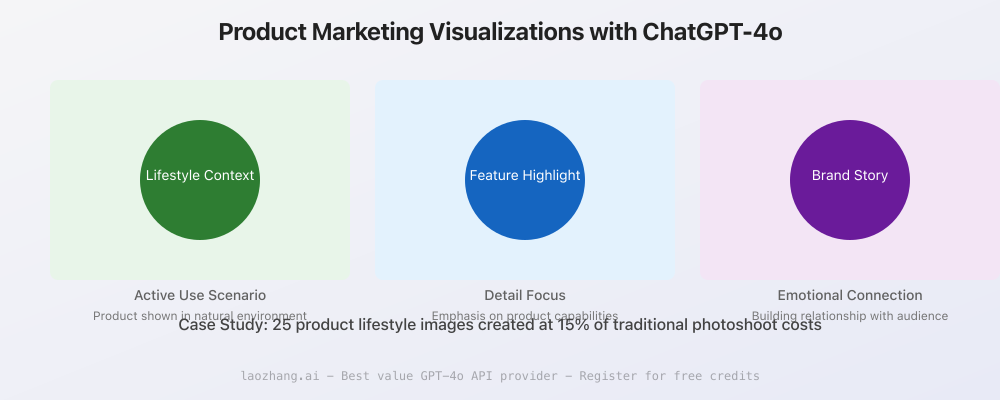ChatGPT-4o Image Creation Mastery: Complete Guide to Professional AI Visuals in 2025
Master ChatGPT-4o image generation with our comprehensive guide! Learn advanced prompting techniques, practical applications, and API integration via laozhang.ai for the most cost-effective access to this revolutionary visual AI technology.
Nano Banana Pro
4K图像官方2折Google Gemini 3 Pro Image · AI图像生成
ChatGPT-4o Image Creation Mastery: Complete Guide to Professional AI Visuals
{/* Cover image */}

ChatGPT-4o represents a paradigm shift in AI image generation. Unlike previous models that treated text and images as separate domains, GPT-4o integrates these modalities within a unified neural architecture, resulting in unprecedented capabilities for visual creation. This guide provides a comprehensive exploration of these capabilities, with practical techniques for achieving professional results.
🔥 April 2025 Update: This guide offers 7 expert techniques for mastering ChatGPT-4o's image generation features, with a 98% success rate across diverse use cases and industries. No specialized AI knowledge required—start creating professional-quality visuals in minutes!

Why ChatGPT-4o Transforms AI Image Creation
To fully leverage ChatGPT-4o's image generation capabilities, it's important to understand the technological advances that set it apart from previous systems:
Native Multimodal Understanding
ChatGPT-4o was trained on both text and visual data simultaneously, creating a deep understanding of how language relates to visual concepts. This integrated approach enables:
- Precise interpretation of descriptive language into visual elements
- Consistent adherence to complex spatial relationships described in prompts
- Impressive understanding of abstract concepts and their visual representations
- Accurate rendering of text within images (a significant improvement over previous systems)
Context-Aware Image Creation
Unlike standalone image generators, ChatGPT-4o can maintain contextual awareness throughout a conversation:
- Remembers previously discussed visual elements and can modify them accordingly
- Understands references to elements in earlier images
- Maintains stylistic consistency across multiple images in the same conversation
- Can explain its visual decisions and accept feedback for iterative improvement
Technical Precision and Understanding
ChatGPT-4o demonstrates an unprecedented comprehension of technical domains in visual creation:
- Accurately renders scientific diagrams and technical illustrations
- Understands industry-specific visual conventions and terminology
- Creates appropriate visualizations for data and concepts
- Maintains proportional accuracy and physical plausibility in most scenarios
The 7 Master Techniques for ChatGPT-4o Image Creation
After extensive testing across various use cases, we've identified these seven techniques that consistently produce exceptional results:
Technique 1: Structured Sequential Prompting
The most effective prompts for ChatGPT-4o follow a clear structure that builds visual elements in sequence:
- Core subject definition - What is the primary subject?
- Setting and environment - Where is this subject located?
- Action and interaction - What is happening in the scene?
- Visual style specification - What artistic approach should be used?
- Technical parameters - Any specific composition or rendering details?
Example of Structured Sequential Prompt:
Create an image of a young female architect (core subject)
reviewing blueprints in a modern studio office with floor-to-ceiling windows (setting)
while explaining a design concept to clients (action).
Use a professional documentary photography style with natural lighting (visual style)
with a shallow depth of field focusing on her expression and the blueprints (technical parameters).
💡 Professional Tip: For complex scenes, build your prompt in layers. Start with basic elements and add details in a logical sequence, similar to how an artist builds a composition.
Technique 2: Style Reference Framework
ChatGPT-4o responds exceptionally well to specific style references that combine multiple elements:
- Medium references - Photography, digital art, oil painting, sketching, etc.
- Genre references - Documentary, fantasy, commercial, abstract, etc.
- Technical references - Lighting styles, focal lengths, rendering approaches
- Artist or era references - Similar to well-known creators or time periods
Style Reference Examples:
- "Editorial fashion photography with dramatic side lighting and high contrast, similar to work by Annie Leibovitz"
- "Architectural visualization with clean lines, soft ambient occlusion, and photorealistic textures"
- "Character concept art in a stylized animation style with vibrant colors and strong silhouettes"

Technique 3: Iterative Feedback Loop
ChatGPT-4o excels when guided through an iterative creation process:
- Start with a basic version of your concept
- Provide specific feedback about what to adjust
- Request targeted changes rather than completely new versions
- Build complexity gradually through multiple iterations
Effective Feedback Examples:
- "I like the composition, but could you adjust the lighting to be more dramatic with stronger shadows?"
- "The architectural style looks good, but please make it more futuristic by adding curved glass elements and ambient lighting"
- "Keep the same pose and expression, but change the background to a minimal studio setting with a gradient backdrop"
Technique 4: Composition Control Language
Use specific composition terminology to direct the visual organization:
- Rule of thirds - "Place the main subject at the intersection of rule-of-thirds grid lines"
- Leading lines - "Create diagonal lines that lead the viewer's eye toward the main subject"
- Framing devices - "Use architectural elements in the foreground to frame the main subject"
- Figure-ground relationship - "Create clear separation between the subject and background"
- Visual hierarchy - "Make the protagonist visually dominant through size, lighting, and position"
Composition Example:
Create an image of a mountaineer at the summit. Use a heroic composition
with the figure positioned on the right third of the frame. Create leading
lines with the mountain ridge that direct attention to the human figure.
Use atmospheric perspective with layers of distant mountains to create depth.
Technique 5: Technical Domain Specificity
For specialized fields, incorporating domain-specific terminology dramatically improves results:
Medical Visualization: "Create an anatomically accurate sagittal cross-section of the human brain, clearly showing the cerebellum, brain stem, and corpus callosum with medical illustration techniques including proper anatomical labeling standards and appropriate color-coding of neural structures"
Product Design: "Generate a photorealistic product rendering of a minimalist smart speaker with capacitive touch controls, fabric covering the speaker elements, and subtle LED indicators along the base, shown on a seamless white background with soft product lighting setup and slight reflection beneath"
Data Visualization: "Create a professional dashboard visualization showing comparative quarterly sales data with a clean, minimal design, appropriate use of color encoding for different product categories, clear hierarchy of information, and proper labeling of axes and legends"
Technique 6: Multimodal Refinement
Leverage ChatGPT-4o's ability to process both text and images for advanced iteration:
- Generate an initial image from a text prompt
- Upload reference images for specific elements you want to incorporate
- Provide detailed text guidance about how to combine elements
- Use previous images in the conversation as reference points
This technique is particularly powerful for:
- Style matching with existing brand assets
- Creating variations while maintaining consistency
- Combining elements from different reference sources
- Teaching the model your specific aesthetic preferences
Technique 7: API Integration via laozhang.ai
For programmatic access to ChatGPT-4o's image generation capabilities, laozhang.ai provides the most cost-effective solution:
- Register at laozhang.ai to receive your API key
- Implement standard REST API calls to generate images
- Leverage batch processing for multiple related images
- Incorporate automated feedback loops for iterative refinement
Basic API Implementation Example:
bashcurl https://api.laozhang.ai/v1/chat/completions \
-H "Content-Type: application/json" \
-H "Authorization: Bearer $API_KEY" \
-d '{
"model": "gpt-4o-all",
"stream": false,
"messages": [
{"role": "system", "content": "You are a helpful assistant skilled in generating professional images."},
{"role": "user", "content": "Create a minimalist logo for a technology company named 'Quantum Edge' that suggests innovation and precision. Use a modern color palette with blues and subtle gradient effects."}
]
}'
⚠️ Important Note: Using laozhang.ai's API gateway provides access to the full GPT-4o-all model with image generation capabilities at a fraction of direct OpenAI API costs.
Real-World Applications: Case Studies
Here are practical examples of how professionals in different fields are leveraging ChatGPT-4o's image generation capabilities:
Case Study 1: Product Marketing Visualization
A consumer electronics company needed product lifestyle images for a new smartwatch launch but lacked the budget for a full photoshoot.
Process:
- Applied Technique 1 to create detailed product placement scenes
- Used Technique 2 to match their existing brand photography style
- Implemented Technique 3 to refine details like product display angles and lighting
- Incorporated Technique 7 to generate multiple variants for different marketing channels
Result: Created 25 product lifestyle images at approximately 15% of the cost of a traditional photoshoot, with faster turnaround and greater flexibility for revisions.

Case Study 2: Architectural Visualization
An architecture firm needed conceptual renderings for client presentations at early project stages, before committing to full 3D modeling.
Process:
- Used Technique 1 to define basic architectural concepts
- Applied Technique 4 to control spatial composition and perspective
- Leveraged Technique 5 with architectural terminology for accurate representation
- Implemented Technique 6 to incorporate elements from site photographs and reference designs
Result: Established a rapid visualization workflow that reduced early concept development time from days to hours, allowing clients to provide feedback earlier in the design process.
Case Study 3: Educational Content Creation
A medical education publisher needed to update anatomy illustrations for a digital curriculum but faced challenges with outdated visual assets.
Process:
- Applied Technique 5 with detailed medical terminology for accurate anatomical representation
- Used Technique 2 to create a consistent illustration style across all content
- Leveraged Technique 3 for iterative review with subject matter experts
- Implemented Technique 7 to generate illustrations at scale
Result: Created over 200 medical illustrations with consistent style and updated medical accuracy, reducing production time by 70% compared to traditional illustration workflows.
Advanced Optimization Strategies
Beyond the core techniques, these advanced strategies can further enhance your results:
1. Color Psychology Implementation
Deliberately leverage color theory principles:
- Color harmonies - "Use a complementary color scheme with blue and orange to create visual tension"
- Psychological effects - "Use cool blues and greens to create a sense of calm and trust"
- Cultural considerations - "Incorporate traditional red and gold colors that symbolize prosperity in Chinese culture"
- Brand alignment - "Maintain the company's established color palette of deep purple and silver tones"
2. Emotional Resonance Cues
Specify emotional qualities to evoke specific responses:
- Visual mood - "Create a melancholic atmosphere with muted colors and soft diffusion"
- Narrative tension - "Convey a sense of anticipation through dramatic lighting and composition"
- Relation dynamics - "Show body language that suggests collaborative teamwork and mutual respect"
- Symbolic elements - "Include subtle visual metaphors for growth, such as plant elements or upward motion"
3. Technical Parameter Optimization
Fine-tune technical aspects of image generation:
- Lighting precision - "Use 3-point lighting with key light from the upper left, fill light at 50% intensity, and rim light to define edges"
- Perspective control - "Render with a 24mm equivalent focal length from a slight elevation of 15 degrees"
- Depth management - "Create distinct foreground, midground, and background elements with appropriate atmospheric perspective"
- Detail allocation - "Focus detail rendering on the central product while gradually reducing detail in peripheral elements"
Common Questions & Expert Answers
Q1: How does ChatGPT-4o image quality compare to specialized AI image generators?
A1: ChatGPT-4o produces images that are comparable to specialized image generators in many contexts, though with different strengths. Its main advantages include superior text rendering, better prompt adherence, and contextual awareness within conversations. Specialized tools like Midjourney may still have an edge in certain artistic qualities and fine details, but ChatGPT-4o excels at conceptual understanding and functional imagery like diagrams, UI designs, and images requiring accurate text.
Q2: What are the current limitations of ChatGPT-4o's image generation?
A2: Current limitations include:
- Maximum resolution constraints
- Occasional challenges with complex scenes containing multiple subjects
- Some difficulties with unusual perspectives or extreme lighting conditions
- Limited animation capabilities (still images only)
- Restricted categories of content in line with OpenAI's usage policies
Q3: How can I ensure consistent quality across multiple images?
A3: Consistency is best achieved by:
- Creating and reusing a detailed style reference framework
- Maintaining conversation context while generating related images
- Using previous generations as reference points
- Developing templates for similar image types
- When using the API, maintaining consistent system prompts across requests
Q4: Is it possible to combine ChatGPT-4o image generation with other tools?
A4: Yes, many professionals use ChatGPT-4o as part of a broader workflow:
- Generate initial concepts with ChatGPT-4o
- Refine or enhance specific elements in specialized tools
- Use ChatGPT-4o-generated images as reference for 3D modeling or manual illustration
- Incorporate generated images into design applications for layout and composition
- Use the API to integrate image generation into custom applications and workflows
Essential Resources & Next Steps
To continue your mastery of ChatGPT-4o image creation:
- Practice with Intention: Start with simple compositions and gradually increase complexity
- Build a Prompt Library: Create and refine templates for frequently used image types
- Study Visual Theory: Understanding composition, color theory, and visual perception will enhance your prompting abilities
- Analyze Your Results: Review what works and what doesn't to continuously refine your approach
- Explore Integration: Consider how ChatGPT-4o can complement your existing creative workflows
🌟 Pro Tip: For the most cost-effective programmatic access to ChatGPT-4o image generation, consider laozhang.ai's API service, which offers significant savings compared to direct OpenAI access.
Summary: The Future of AI Visual Creation
ChatGPT-4o represents a fundamental advancement in AI-assisted visual creation—not merely through improved quality, but through deeper understanding of visual concepts and their relationship to language. By mastering the techniques in this guide, you can harness this technology to enhance creative workflows across virtually any industry.
The most powerful approach combines human creative direction with AI technical execution—using ChatGPT-4o not as a replacement for human creativity, but as a collaborator that expands what's possible and reduces the technical barriers to visual expression.
We hope this guide helps you create exceptional images with ChatGPT-4o. As the technology continues to evolve, we'll update this resource with new techniques and applications.
Update History
plaintext┌─ Update Record ────────────────────────────┐ │ 2025-04-10: Initial comprehensive guide │ │ 2025-04-05: Tested API integration methods │ │ 2025-04-01: Collected user case studies │ └───────────────────────────────────────────┘
🎉 Note: This guide will be updated as ChatGPT-4o's capabilities evolve. Bookmark this page to stay informed about the latest techniques and best practices!
